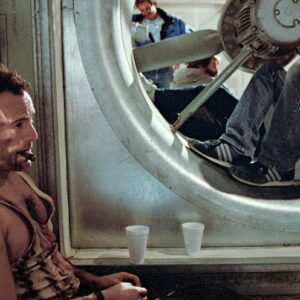Introduction
Daniel Radcliffe, an actor whose name is synonymous with the role of Harry Potter, has long been a household figure in the world of cinema. But to view Radcliffe’s career solely through the lens of his most iconic role would be to miss the full scope of his contributions to film and theater. Since the conclusion of the Harry Potter franchise, Radcliffe has proven himself to be a versatile and boundary-pushing artist, exploring the depths of drama and fantasy cinema with a series of groundbreaking and unconventional choices. His commitment to challenging genre norms and his openness to experimental narratives have significantly shaped both the fantasy and drama genres, and his work has inspired a new generation of filmmakers and actors.
This article will explore Daniel Radcliffe’s impact on the world of drama and fantasy, examining the milestones that have defined his career, the unconventional roles he has embraced, and the lasting influence he continues to exert on the cinematic landscape.
1. His Breakthrough Role in Harry Potter
Daniel Radcliffe’s journey into the world of film began at the tender age of eleven when he was cast as the young wizard Harry Potter in J.K. Rowling’s beloved book series. Over the course of a decade, Radcliffe embodied the character in all eight films, helping to bring Rowling’s magical universe to life in a way that captivated audiences across the globe. The Harry Potter franchise was not merely a box-office success but a cultural juggernaut that forever changed the landscape of fantasy cinema.
At its heart, the Harry Potter series was a coming-of-age tale set in a magical world, combining elements of fantasy with profound emotional and philosophical themes. Radcliffe’s portrayal of the titular character was integral to the series’ success. As Harry, Radcliffe captured the complexities of youth, responsibility, and courage, while simultaneously grounding the fantastical elements of the story in a relatable and human performance. His ability to balance the wonder and danger of the wizarding world with the personal struggles of adolescence made him an ideal lead for a series that was both about magic and about growing up.
Key Impact: Radcliffe’s portrayal of Harry Potter helped elevate fantasy films into the mainstream. The success of the series proved that complex, magical worlds could resonate deeply with global audiences, setting the stage for the continued growth of the genre. More importantly, it demonstrated that fantasy cinema was not just for children—it could address universal themes with depth and sophistication, opening the doors for future generations of filmmakers to explore fantasy narratives with greater emotional and intellectual complexity.
2. Expanding His Range: Post-Harry Potter Roles
After the conclusion of the Harry Potter franchise, many actors find themselves typecast in similar roles. Yet Radcliffe quickly sought to carve out a new identity for himself, choosing projects that were distinctly different from his wizarding days. His post-Potter career has been marked by a willingness to take risks, seeking out roles that challenge his acting abilities and diversify his portfolio.
Radcliffe’s early choices included films like The Woman in Black (2012), a gothic horror film where he played a young lawyer confronted by a vengeful spirit. The film, set in a bleak and oppressive English countryside, was a stark departure from the lighthearted magic of Hogwarts. In this chilling role, Radcliffe proved that he was capable of handling darker, more mature material. His restrained yet intense performance showcased his ability to anchor a film with subtlety and emotion, signaling to audiences that there was more to him than just the boy-who-lived.
However, it was his role in Swiss Army Man (2016) that truly redefined the boundaries of his career. In this surreal comedy-drama, Radcliffe played a dead body that washes ashore and becomes the companion of a stranded man, played by Paul Dano. The film is strange, dark, and profoundly absurd, yet it is also deeply emotional and thought-provoking. Radcliffe’s commitment to this bizarre role—including scenes where his character literally functions as a farting, talking Swiss Army knife—revealed a bold willingness to embrace unconventional and niche material. Swiss Army Man was a critical success, and Radcliffe’s performance was widely praised for its eccentricity and vulnerability.
Key Impact: Radcliffe’s post-Potter career has demonstrated that actors can thrive beyond the constraints of a single, iconic role. His eclectic range of choices has contributed to the growing respect and creative evolution of both the fantasy and drama genres. By taking on a variety of roles, from horror to avant-garde comedy, Radcliffe has proven that genre versatility is a hallmark of true talent, inspiring future actors to explore the full breadth of their craft.
3. Championing Unique and Niche Fantasy Films
Radcliffe’s career has also been marked by his embrace of genre-blending films that defy traditional categorization. Films like Now You See Me 2 (2016) and Horns (2013) represent a departure from conventional fantasy or drama narratives, merging genres in innovative ways.
Now You See Me 2, for example, is a sequel to the popular heist-thriller film about illusionists who use their performances to commit crimes. Radcliffe plays a character with complex motivations, and the film mixes fantasy-like illusions with action and mystery. Similarly, Horns, based on the novel by Joe Hill, is a dark fantasy that blends elements of horror, romance, and supernatural thriller. Radcliffe plays a man who, after being accused of murdering his girlfriend, mysteriously grows horns that give him the power to compel others to confess their sins.
In each of these films, Radcliffe pushes the boundaries of what fantasy cinema can achieve, offering new, experimental takes on the genre. He has shown that fantasy need not be confined to traditional tropes or narratives. By taking on quirky, genre-bending roles, Radcliffe has helped elevate fantasy filmmaking beyond the realm of escapism, making it a more complex and thought-provoking medium.
Key Impact: Radcliffe’s embrace of niche, experimental films has shown that fantasy and drama are capable of profound exploration. By taking risks with unconventional projects, he has helped push the boundaries of genre filmmaking, demonstrating that fantasy can be not just entertaining but intellectually stimulating and artistically challenging. His choices have encouraged a more fluid and open-minded approach to genre filmmaking, influencing both contemporary filmmakers and audiences to embrace more daring and thought-provoking stories.
4. Building Legacy Through Theater and TV
Daniel Radcliffe’s contribution to drama extends beyond the silver screen. His work on stage, particularly in productions like Equus (2007) and The Cripple of Inishmaan (2013), has been crucial in cementing his reputation as a versatile and talented actor.
Equus, Peter Shaffer’s intense play about a troubled teenager who blinds horses, marked a significant departure for Radcliffe, who was known primarily for his role in the family-friendly Harry Potter films. His decision to take on a role that was sexually charged, psychologically complex, and emotionally intense was a bold move that garnered both critical acclaim and controversy. Radcliffe’s portrayal of Alan Strang, the emotionally tormented young man, demonstrated his ability to inhabit difficult and dark characters with sensitivity and depth.
Later, in The Cripple of Inishmaan, Radcliffe took on the role of Billy, a disabled young man living on a remote Irish island. The play, known for its dark humor and poignant moments, allowed Radcliffe to showcase his ability to blend comedy and pathos. His performance in this production helped establish him as a versatile actor capable of shifting effortlessly between comedy, tragedy, and everything in between.
Beyond the stage, Radcliffe has also ventured into television, notably starring in the anthology series Miracle Workers (2019–present), where he plays a variety of quirky characters across different seasons. His work on television has allowed him to explore new formats and further solidify his place in the world of dramatic storytelling.
Key Impact: Radcliffe’s success in both theater and television has expanded the boundaries of his legacy. By taking on challenging roles across multiple platforms, he has helped elevate the visibility of dramatic works and proven that actors can make significant contributions to the arts across all mediums. His versatility in theater and TV has inspired other actors to follow similar paths, emphasizing the importance of cross-platform artistry and the value of expanding one’s range beyond film.
5. Influence on New Generations of Filmmakers and Actors
Daniel Radcliffe’s career choices have had a profound impact on the entertainment industry, particularly on the new generation of filmmakers and actors. His fearless approach to role selection, his ability to challenge expectations, and his openness to genre experimentation have paved the way for other actors to take risks and embrace unconventional narratives. His work in genre-bending films has encouraged filmmakers to explore new possibilities within fantasy and drama, proving that these genres can be both commercially successful and intellectually stimulating.
Radcliffe’s willingness to take on roles that many actors would shy away from has also inspired countless aspiring actors to think outside the box when considering their own careers. His legacy as a pioneering force in fantasy and drama will undoubtedly continue to influence the trajectory of film and theater for years to come.
Key Impact: By pushing the boundaries of what is expected in both fantasy and drama, Radcliffe has become a role model for young actors and filmmakers. His ability to blend mainstream appeal with artistic integrity has demonstrated that one can build a successful career without sacrificing creativity or innovation. His influence continues to resonate, ensuring that both genres remain vital and relevant in modern cinema.
Conclusion
Daniel Radcliffe’s career is a testament to the transformative power of an actor’s willingness to embrace change and experimentation. Through his iconic role as Harry Potter and his diverse portfolio of post-Potter projects, Radcliffe has reshaped the landscape of both fantasy and drama. His ability to take on complex, unconventional roles has expanded the boundaries of these genres, allowing them to evolve into more sophisticated and thought-provoking mediums. As Radcliffe continues to push the envelope with his performances, his legacy as a transformative force in the world of cinema will undoubtedly endure for generations to come.





